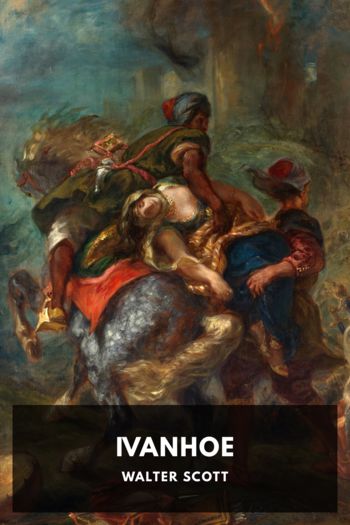Ivanhoe - Walter Scott (bookreader txt) 📗

- Author: Walter Scott
Book online «Ivanhoe - Walter Scott (bookreader txt) 📗». Author Walter Scott
It is not, perhaps, necessary to enumerate so many reasons why the author of the Scottish Novels, as they were then exclusively termed, should be desirous to make an experiment on a subject purely English. It was his purpose, at the same time, to have rendered the experiment as complete as possible, by bringing the intended work before the public as the effort of a new candidate for their favour, in order that no degree of prejudice, whether favourable or the reverse, might attach to it, as a new production of the Author of Waverley; but this intention was afterwards departed from, for reasons to be hereafter mentioned.
The period of the narrative adopted was the reign of Richard I, not only as abounding with characters whose very names were sure to attract general attention, but as affording a striking contrast betwixt the Saxons, by whom the soil was cultivated, and the Normans, who still reigned in it as conquerors, reluctant to mix with the vanquished, or acknowledge themselves of the same stock. The idea of this contrast was taken from the ingenious and unfortunate Logan’s tragedy of Runnamede, in which, about the same period of history, the author had seen the Saxon and Norman barons opposed to each other on different sides of the stage. He does not recollect that there was any attempt to contrast the two races in their habits and sentiments; and indeed it was obvious, that history was violated by introducing the Saxons still existing as a high-minded and martial race of nobles.
They did, however, survive as a people, and some of the ancient Saxon families possessed wealth and power, although they were exceptions to the humble condition of the race in general. It seemed to the author, that the existence of the two races in the same country, the vanquished distinguished by their plain, homely, blunt manners, and the free spirit infused by their ancient institutions and laws; the victors, by the high spirit of military fame, personal adventure, and whatever could distinguish them as the Flower of Chivalry, might, intermixed with other characters belonging to the same time and country, interest the reader by the contrast, if the author should not fail on his part.
Scotland, however, had been of late used so exclusively as the scene of what is called Historical Romance, that the preliminary letter of Mr. Laurence Templeton became in some measure necessary. To this, as to an Introduction, the reader is referred, as expressing author’s purpose and opinions in undertaking this species of composition, under the necessary reservation, that he is far from thinking he has attained the point at which he aimed.
It is scarcely necessary to add, that there was no idea or wish to pass off the supposed Mr. Templeton as a real person. But a kind of continuation of the Tales of my Landlord had been recently attempted by a stranger, and it was supposed this Dedicatory Epistle might pass for some imitation of the same kind, and thus putting enquirers upon a false scent, induce them to believe they had before them the work of some new candidate for their favour.
After a considerable part of the work had been finished and printed, the Publishers, who pretended to discern in it a germ of popularity, remonstrated strenuously against its appearing as an absolutely anonymous production, and contended that it should have the advantage of being announced as by the Author of Waverley. The author did not make any obstinate opposition, for he began to be of opinion with Dr. Wheeler, in Miss Edgeworth’s excellent tale of Manoeuvring, that “Trick upon Trick” might be too much for the patience of an indulgent public, and might be reasonably considered as trifling with their favour.
The book, therefore, appeared as an avowed continuation of the Waverley Novels; and it would be ungrateful not to acknowledge, that it met with the same favourable reception as its predecessors.
Such annotations as may be useful to assist the reader in comprehending the characters of the Jew, the Templar, the Captain of the mercenaries, or Free Companions, as they were called, and others proper to the period, are added, but with a sparing hand, since sufficient information on these subjects is to be found in general history.
An incident in the tale, which had the good fortune to find favour in the eyes of many readers, is more directly borrowed from the stores of old romance. I mean the meeting of the King with Friar Tuck at the cell of that buxom hermit. The general tone of the story belongs to all ranks and all countries, which emulate each other in describing the rambles of a disguised sovereign, who, going in search of information or amusement, into the lower ranks of life, meets with adventures diverting to the reader or hearer, from the contrast betwixt the monarch’s outward appearance, and his real character. The Eastern tale-teller has for his theme the disguised expeditions of Haroun Alraschid with his faithful attendants, Mesrour and Giafar, through the midnight streets of Bagdad; and Scottish tradition dwells upon the similar exploits of James V, distinguished during such excursions by the travelling name of the Goodman of Ballengeigh, as the Commander of the Faithful, when he desired to be incognito, was known by that of Il Bondocani. The French minstrels are not silent on so popular a theme. There must have been a Norman original of the Scottish metrical romance of Rauf Colziar, in which Charlemagne is introduced as the unknown guest of a charcoal-man.2 It seems to have been the original of other poems of the kind.
In merry England there is no end of





Comments (0)